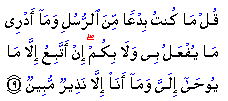Plain Warner, Prayer of a Tree, Denial
Issue 490 » August 15, 2008 - Shaban 13, 1429
Living The Quran
Al-Ahqaf (Sand Dunes)
Chapter 46: Verse 9
 A Plain Warner
A Plain Warner
"Say: I am not the first of God's messengers. I do not know what will be done with me or with you. I only follow what is being revealed to me. I am only a plain warner."
The Prophet Muhammad (peace be upon him) was not a totally new phenomenon: he was one in a line of God's messengers. His situation was the same as all messengers who preceded him. He was an ordinary human being whom God knew to be suited to deliver His message. Therefore, he gave him His revelations and the Prophet carried out God's orders. This is what a Divine message is like. When a messenger of God feels this bond, he does not ask God for proof, nor does he request anything special for himself: he simply moves on to deliver God's message as it is revealed to him. He gets on with the task of delivering his message, not because of any knowledge he has of the realm that lies beyond human perception, nor because of any information given to him about what will happen to him, his people or his message. He simply follows instructions, trusting his Lord, submitting himself to Him. The future is unknown to him; its secrets are with his Lord and he does not seek to know them. He has all the reassurance he needs, and he realizes that the proper attitude for him is not to look beyond the limits of the mission he has been assigned.
Those advocates of Islam endowed with profound insight into its message follow in the footsteps of the Prophet and find the same reassurance. They carry on with their advocacy of the Divine message seeking neither personal gain nor self interest. They do not know what the future holds for it or for them. They do not ask their Lord for evidence; they have all the evidence they need in their hearts. Nor do they pray for any special favour; it is sufficient favour for them that they follow this line. They discharge their duty, and this is enough for them. They do not overstep the fine line God has demarcated for them.
Source:
"In The Shade Of The Quran" - Sayyid Qutb, Vol 15, pp, 343-344
Understanding The Prophet's Life
Prayer of a Tree
Narrated by Ibn Abbas: "A Man went to the Prophet, upon him be the peace and blessings of Allah, and said, 'Last night, in a dream, I saw myself praying beneath a tree. When I prostrated myself, the tree prostrated too, and I hear it say: "O Lord! Write for me the recompense (of the prayer), delete because of it a sin, make of it a treasure for me, and accept it of me as You accepted it of the Prophet Dawud, upon him be peace".' I later witnessed the Prophet of Allah, upon him be peace, prostrate and repeat the words of the tree as related by the man from his dream."
Now, as is apparent, the man who had the dream had so completely absorbed the teachings of Islam that even in his sleep they gave fruit to his soul. But, more importantly, we learn that the heart of the Prophet, the Master, enveloped in the love of Allah, could be moved by anything spiritual so that it picked up the words of the dua ascribed to the tree, and retained them so that the Prophet could repeat them in his own prostration. Indeed, the harmony of the Prophets with their Lord is one that reverberates at the slightest touch.
Source:
"Remembrance and Prayer" - Muhammad Al-Ghazali, p. 144
Blindspot!
DenialDenial means we act as if the present is good enough. It is defence against the woundedness of the present and a rejection of any possibility beyond continuous improvement. Our denial of the destruction of the environment is a good example. Denial in this case takes the form of wanting more data or holding the belief that technology is a god that can surmount any obstacle. It often agrees there is a problem, but then trivializes its existence or its cost.
Denial is a defining feature of addiction. In creating the communities we live in, we are addicted to urban centres and rural towns that don't work for all, to a world of large class differences, to a place where we consider people on the margin to not be our brothers and sisters. We are addicted to accepting the illusion of safety that we get from allowing large systems to name the game and define the conversation.
Source:
"Community: The Structure of Belonging" - Peter Block, pp. 133-134